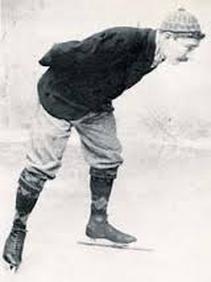- a sport for boys and girls
- open to all ages
- good exercise
- all this and fun too
- teach skating skills
- improve skills you have
- help you skate faster
- help you skate better
- make new friends
- receive coaching
- measure their improvement
- enter skating meets
- compete with others at same level
- win trophies, medals, and ribbons
History of Speedskating
 Hundreds of years ago – long before there were skin suits and indoor arenas – people strapped blades to their feet and sped across frozen ponds, rivers and canals for communication between villages in northern Europe. Competitions evolved and mens speedskating made it’s Olympic Winter Games debut in Chamonix in 1924. Women’s races were added in 1932 at Lake Placid, New York as a demonstration sport, but were not officially included until 1960 Squaw Valley Olympics.
Hundreds of years ago – long before there were skin suits and indoor arenas – people strapped blades to their feet and sped across frozen ponds, rivers and canals for communication between villages in northern Europe. Competitions evolved and mens speedskating made it’s Olympic Winter Games debut in Chamonix in 1924. Women’s races were added in 1932 at Lake Placid, New York as a demonstration sport, but were not officially included until 1960 Squaw Valley Olympics.
The modern sport of speedskating is divided into short track and long track. Short track is all about speed, pitting groups of skaters against each other on a 111-meter oval, competing at lengths of 500, 1000 and 1500 meters, with 3000 and 5000 meter relays. It was added as an official Olympics sport at the 1992 Albertville games. Long track challenges skaters to beat the clock. Two racers compete at one time, crossing from inner to outer tracks on a 400 meter oval, but rarely coming in contact with one another. Individual Olympic events include 500, 1000, 1500, 3000 (women only), 5000, and 10000 (men only) meter. There is also a Team Pursuit event requiring a team of three racing against the clock.
About Safety
Speedskating is not more dangerous than other ice sports. Most injuries are minor and the result of falls during practice or competition. For this reason, skaters are taught how to fall and get up quickly. They are also required to protect themselves from possible injury by wearing long sleeves, gloves, neck protector, knee pads and a hard shell helmet at all times while on the ice.
History of Lakewood Skating Club
 Early in the 1940’s, a small group of speedskating enthusiasts formed the Lakewood Skating Club. The Lakewood Skating Club has a long history of providing supervised training in speedskating. It is the hope of the Club to help develop not only strong skaters, but also help the skaters develop good character, strong sportsmanship and good health.The Lakewood Skating Club has a long history of success, producing champions as well as fine individuals. The club has nurtured the talents of numerous National and North American Champions, over 15 National Team members, 6 World Team members, and 3 Olympic Team members.
Early in the 1940’s, a small group of speedskating enthusiasts formed the Lakewood Skating Club. The Lakewood Skating Club has a long history of providing supervised training in speedskating. It is the hope of the Club to help develop not only strong skaters, but also help the skaters develop good character, strong sportsmanship and good health.The Lakewood Skating Club has a long history of success, producing champions as well as fine individuals. The club has nurtured the talents of numerous National and North American Champions, over 15 National Team members, 6 World Team members, and 3 Olympic Team members.
The Lakewood Speedskating Club is a member of the Ohio Speedskating Association and U.S. Speedskating.
Coaches
Julie Koons grew up in New Berlin, WI and began skating at age 6. She won two bronze medals at the 1996 Senior World and World Team Championships. She was also a bronze medalist at the 1997 Junior World Championships. Throughout her skating career Julie held multiple Senior and Junior American records. She was a member of both the 1998 and 2002 Olympic Teams as part of the 3000 meter short track relay team. Julie is is a U.S. Speedskating Level 1 Certified Coach.